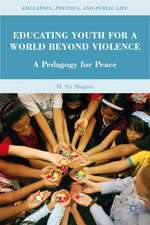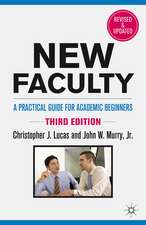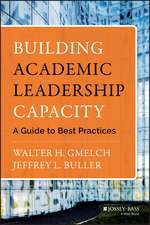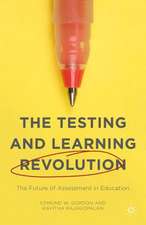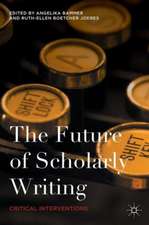Pitfalls of Scholarship: Lessons from Islamic Studies
Autor Ahmad Atif Ahmaden Limba Engleză Hardback – 5 feb 2016
| Toate formatele și edițiile | Preț | Express |
|---|---|---|
| Paperback (1) | 634.00 lei 6-8 săpt. | |
| Palgrave Macmillan US – 31 mar 2018 | 634.00 lei 6-8 săpt. | |
| Hardback (1) | 584.10 lei 38-44 zile | |
| Palgrave Macmillan US – 5 feb 2016 | 584.10 lei 38-44 zile |
Preț: 584.10 lei
Preț vechi: 634.89 lei
-8% Nou
Puncte Express: 876
Preț estimativ în valută:
111.77€ • 121.79$ • 94.18£
111.77€ • 121.79$ • 94.18£
Carte tipărită la comandă
Livrare economică 19-25 aprilie
Preluare comenzi: 021 569.72.76
Specificații
ISBN-13: 9781137565358
ISBN-10: 1137565357
Pagini: 188
Ilustrații: XI, 188 p.
Dimensiuni: 140 x 216 x 13 mm
Greutate: 0.4 kg
Ediția:1st ed. 2016
Editura: Palgrave Macmillan US
Colecția Palgrave Macmillan
Locul publicării:New York, United States
ISBN-10: 1137565357
Pagini: 188
Ilustrații: XI, 188 p.
Dimensiuni: 140 x 216 x 13 mm
Greutate: 0.4 kg
Ediția:1st ed. 2016
Editura: Palgrave Macmillan US
Colecția Palgrave Macmillan
Locul publicării:New York, United States
Cuprins
Acknowledgements
Introduction
1. Defending the Defenseless: The Humanities and Islamic Studies from an Oblique Angle
2. The First Person Singular: Personal and Social Knowledge in Conflict
3. Method, Discovery, and Knowledge
4. Democracy, National Religions, Disorder
5. Curriculum Vitae
Conclusion
Bibliography
Index
Introduction
1. Defending the Defenseless: The Humanities and Islamic Studies from an Oblique Angle
2. The First Person Singular: Personal and Social Knowledge in Conflict
3. Method, Discovery, and Knowledge
4. Democracy, National Religions, Disorder
5. Curriculum Vitae
Conclusion
Bibliography
Index
Notă biografică
Ahmad Atif Ahmad is Professor of Religious Studies at the University of California, Santa Barbara, USA. He also served as Chair of Middle East Studies at the College of William and Mary, USA, and Associate Academic Director of the University of California, Washington Center, USA. He is the author of The Fatigue of the Shari'a.
Textul de pe ultima copertă
Pitfalls of Scholarship offers an array of reflections on higher education, its entanglements with humanity's pursuit of natural and social knowledge, and the impact national environments have upon it. This book considers the humanities, vocational, and scientific/technological sides of the university from the vantage-point of an Islamic studies scholar in twenty-first century American academia. Four discussions and a personal note make up the parts of these pages. The first discussion sets the stage with a description of the irregularities of our age of late modernity and the limits of scholarship in it. The second focuses on clashes of personal and academic knowledge with social assumptions and convictions. Guiding the discussion is an unlikely narrative from an old era where academic freedom did not exist. The third discussion points to the surprisingly negative impacts of obsession with research methods in the modern academy. "Scholarships of negation" are identified as the main illness of the age, next to popular exaggerations of the value of standard assumptions and excellent academic institutions. The fourth and final section deals with modern education's aspiration toward acquiring democratic quality, and the implications of further democratization of education.

